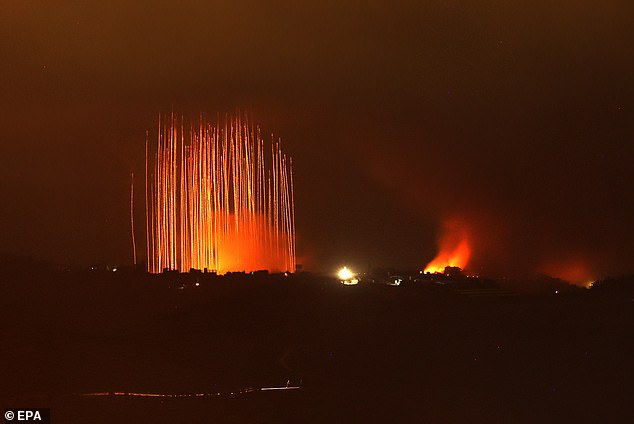Iran announced on Wednesday that its largest-ever missile assault on Israel had concluded, barring further provocations. This comes after Tehran launched over 180 ballistic missiles at Israeli military targets on Tuesday night, marking a significant escalation in the ongoing conflict. Despite calls for a ceasefire from the United Nations, the United States, and the European Union, fighting between Israel and Hezbollah continued, raising fears of a broader regional war.
On Wednesday, Israel resumed its bombardment of Beirut’s southern suburbs, a stronghold of the Iran-backed Hezbollah group. At least a dozen airstrikes hit what Israel described as Hezbollah targets, sending plumes of smoke billowing over the area. The strikes followed new evacuation orders from Israel, as the suburbs had largely emptied after days of heavy bombardment.
Hezbollah claimed it repelled Israeli forces attempting to infiltrate the Lebanese town of Adaisseh early on Wednesday, forcing them to retreat.
Iran’s ‘Defensive’ Attack
Tehran described its missile barrage as a defensive move aimed solely at Israeli military facilities, responding to recent Israeli operations that killed senior leaders of Hezbollah and Hamas. Iranian state media confirmed that three Israeli military bases were targeted in Tuesday’s attack.
“Our action is concluded unless the Israeli regime decides to invite further retaliation. In that scenario, our response will be stronger and more powerful,” Iranian Foreign Minister Abbas Araqchi stated in a post on X (formerly Twitter) early Wednesday.
Israeli Prime Minister Benjamin Netanyahu vowed swift retaliation, declaring, “Iran made a big mistake tonight – and it will pay for it.” Netanyahu convened an emergency security cabinet meeting following the missile assault, signaling that a response was imminent.
The United States, Israel’s key ally, quickly pledged support, with U.S. Secretary of Defense Lloyd Austin assuring that Washington was “well-postured” to defend its interests in the Middle East. Austin confirmed that U.S. Navy warships had launched interceptors against Iranian missiles targeting Israel and promised to remain in close coordination with Israeli defense officials.
“Nearly 200 missiles were launched at Israel, and the U.S. defense coalition played a crucial role in intercepting them,” Israeli Rear Admiral Daniel Hagari said. He called the missile attack a “severe and dangerous escalation.”
While Iran boasted that 90% of its missiles hit their targets, Israel claimed that most of the projectiles were intercepted. Iran’s Revolutionary Guards reported using hypersonic Fattah missiles for the first time in the conflict, signaling the sophisticated nature of the assault.
International Calls for Ceasefire
Despite calls for restraint, tensions in the region continue to mount. French President Emmanuel Macron strongly condemned Iran’s missile attack and confirmed that France had mobilized military resources in the Middle East to support Israel’s security.
At the United Nations, Israel’s U.N. Ambassador Danny Danon warned that Iran would soon “feel the consequences” of its actions. “The response will be painful,” he said, while the White House echoed similar sentiments, promising “severe consequences” for Tehran.
U.S. President Joe Biden backed Israel, describing Iran’s attack as “ineffective,” but warned that the U.S. would act if necessary to defend its interests. Vice President Kamala Harris also underscored Washington’s commitment to standing by Israel, warning that Iran would face repercussions for its actions.
Israel’s ground operations in southern Lebanon, which began earlier this week, have resulted in mounting casualties. Lebanese government statistics show nearly 1,900 people killed and over 9,000 wounded in nearly a year of cross-border fighting, with most of the casualties occurring in the past two weeks.
The United Nations Security Council scheduled an emergency meeting to address the escalating conflict, while the European Union called for an immediate ceasefire to prevent further bloodshed.

